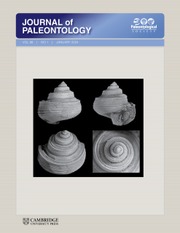No CrossRef data available.
Article contents
Maastrichtian crustacea (Brachyura: Decapoda) from the Ocozocuautla Formation in Chiapas, southeast Mexico
Published online by Cambridge University Press: 14 July 2015
Abstract
More than thirty complete specimens of Carcineretes planetarius Vega, Feldmann, Ocampo, and Pope, 1997, a member of the extinct decapod family Carcineretidae, have been collected from the upper part of the Ocozocuautla Formation in Chiapas, southeast Mexico. Stratigraphic occurrences of Carcineretes in the Caribbean Province suggest that this crab should be regarded as an index fossil for the early Maastrichtian. Six samples of this species may represent individuals that died during molting. The sudden disappearance of this family at the end of the Maastrichtian and its restricted paleobiogeographic distribution in the vicinity of the impact site suggest that the Carcineretidae may have been affected by the Chicxulub impact. Other decapod specimens collected from the same localities were assigned to the Xanthidae; Parazanthopsis meyapaquensis new genus and species, and Megaxantho zoque, new genus and species, are described. They constitute the second and third reports of Cretaceous xanthid crabs from Mexico. A lagoonal paleoenvironment is suggested, based on associated fauna and flora. Occurrences of index species of benthic and planktic foraminifera along with that of diagnostic rudist species confirm an early Maastrichtian age.
- Type
- Research Article
- Information
- Copyright
- Copyright © The Paleontological Society 2001


